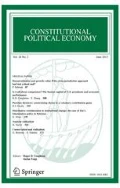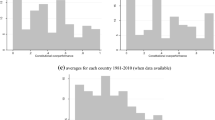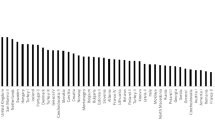Abstract
In this paper we propose two new indicators of de facto constitutional constraints. The indicators are based on the presence or the absence of easily observable political events. This makes the proposed measures relatively objective and easy to verify relative to the most widely used indicators of de jure and de facto constitutions. This paper describes the indicators and demonstrates their usefulness for research on economic development.
Similar content being viewed by others
Notes
This case is widely publicized and politically significant, so we (or any expert) could easily detect the case.
Ríos-Figueroa and Staton classification (2014) would definethe criterion as a “de facto measure”.
To assess the observable regime as RoLD we use stronger form of the criterion (3) “…AND call for its replacement, without routine intimidation, revenge or punishment?”.
The total number of observations actually engaged in the analysis restricted by GDP per capita Growth rate data availability so we have got 12,160 observations without imputation and 25,375 observations with imputed data (see Descriptive Statistics in the Supplemental Materials https://papers.ssrn.com/abstract=2993465; imputation procedure see pp. 21–22 of Supplemental materials).
Lipset hypothesized that Democracy is caused and supported by sustainable economic development, political and cultural maturity.
References
Alvarez, M., Cheibub, J. A., Limongi, F., & Przeworski, A. (1996). Classifying political regimes. Studies in Comparative International Development, 31, 1–37.
Barro, R. J. (1999). Determinants of economic growth. London: MIT Press.
Bils, M., & Klenow, P. J. (2000). Does schooling cause growth? The American Economic Review, 90(5), 1160–1183.
Bolt, J., & van Zanden, J. L. (2014). The Maddison Project: collaborative research on historical national accounts. The Economic History Review, 67(3), 627–651.
Dupuy E. R., & Dupuy T. N. (1986). The encyclopedia of military history (2nd ed.). Harper & Row Publishers.
La Porta, R., López-de-Silanes, F., Pop-Eleches, C., & Shleifer, A. (2004). Judicial Checks and Balances. Journal of Political Economy, 112(2), 445–470.
Lipset, S. M. (1959). Some social requisites of democracy: Economic development and political legitimacy. American Political Science Review, 53(01), 69–105.
Polity IV Project: Political Regime Characteristics and Transitions, 1800–2010 Monty G. Marshall, Director http://www.systemicpeace.org/polity/polity4.htm.
Przeworski, A. (2000). Democracy and development: Political institutions and well-being in the world, 1950–1990. Cambridge: Cambridge University Press.
Ríos-Figueroa, J., & Staton, J. K. (2014). An evaluation of cross-national measures of judicial independence. Journal of Law Economics and Organization, 30(1), 104–137.
Suharev, A. Ya. (Ed.). (2003). Legal system of the countries around the world (3rd ed.). Moscow: Norma.
Tavares, J., & Wacziarg, R. (2001). How democracy affects growth. European economic review, 45(8), 1341–1378.
Aknowledgements
We wish to thank the Editor in Chief Roger Congleton for his help that greatly influenced this article. We are also grateful to three anonymous referees for comments and references.
Author information
Authors and Affiliations
Corresponding author
Rights and permissions
About this article
Cite this article
Yanovskiy, M., Ginker, T. A proposal for a more objective measure of de facto constitutional constraints. Const Polit Econ 28, 311–320 (2017). https://doi.org/10.1007/s10602-017-9242-1
Published:
Issue Date:
DOI: https://doi.org/10.1007/s10602-017-9242-1
Keywords
- De facto constitutional constraints
- Constitutional constraints
- Expert ranking
- Retrospective assessments
- Democracy and growth




